

NACD UAC Grants North Central Region
The National Association of Conservation Districts (NACD) and the Natural Resources Conservation Service (NRCS) are proud partners in support of the Urban Agriculture Conservation (UAC) Grant Initiative.
Since 2016, the Initiative has provided approximately $5.6 million in competitive grants in support of over 122 projects in 35 states. Through these grants, conservation districts increased their capacity related to urban technical assistance and small-scale conservation, while addressing community needs in both rural and urban contexts.
Grantees have successfully partnered with a multitude of organizations to support community farming and gardening programs, expanded outreach capacities to current and underrepresented clients, planned operations to extend growing seasons through the use of hoop houses and other practices, remediated poor-yielding agricultural sites, and contributed to many other natural resource conservation efforts. Each conservation district is also proud to share the outcomes and ongoing activities of their projects; take a tour below of all the recipients to date.
For additional information, see the detailed project reports from the 2016 and 2017 granting cycles and visit NACD’s website ( www.nacdnet.org ) to learn more about all of NACD’s activities in support of conservation districts.
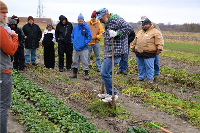
IA - Johnson Soil and Water Conservation District

IL - Clinton County Soil and Water Conservation District
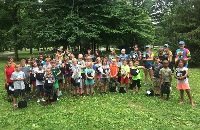
IN - Hamilton County Soil and Water Conservation District
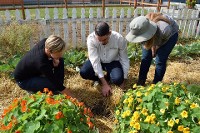
IN - Marion County Soil and Water Conservation District

MI - Alger Conservation District
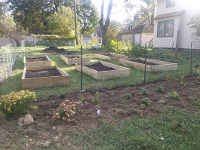
MI - Genesee Conservation District

MI - Kent Conservation District

MI - Marquette County Conservation District

MN - Hubbard County Soil and Water Conservation District

MN - North St. Louis Soil and Water Conservation District

MN - Ramsey Conservation District
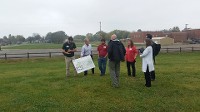
MO - Boone County Soil and Water Conservation District
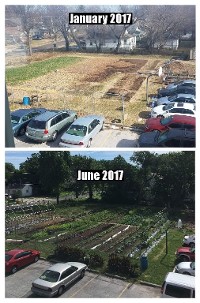
MO - Greene County Soil and Water Conservation District

OH - Ashland Soil and Water Conservation District
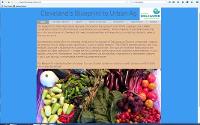
OH - Cuyahoga Soil and Water Conservation District

OH - Franklin Soil and Water Conservation District
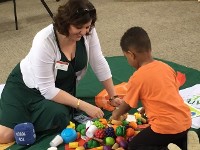
OH - Hamilton County Soil and Water Conservation District
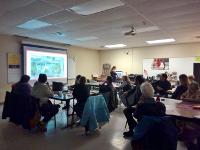
OH - Lucas Soil and Water Conservation District
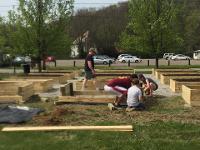
OH - Muskingum Soil and Water Conservation District
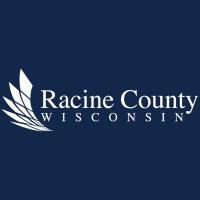
WI - Racine County
IA - Johnson Soil and Water Conservation District
2017 Grantee
The purpose of the Johnson Soil and Water Conservation District (SWCD) project was to improve land quality at the Johnson County Poor Farm, where fresh produce was being grown by the nonprofit Grow: Johnson County for donation to area food pantries and the Iowa Valley Global Food Project, a community garden program that creates opportunities for immigrant community members and underserved populations. Improvements were expected to benefit both nonprofit organizations leasing land at the farm in fulfilling their missions to increase food for the greater Johnson County community.
Despite the high volume of food grown, there were barriers to growing at this location. Poor drainage was one of the largest obstacles to production success. This project implemented recommended conservation practices and drainage infrastructure, assisted with conducting soils health tests, conducted four on-farm soil health workshops targeting underserved populations, and developed a successful educational and outreach campaign through social media.
Through the project, cover crops were seeded; waterways were shaped, seeded and matted; and tiling installed. In preparation for installation of conservation practices, meetings were held with Grow: Johnson County and contractors. Soil health monitoring analysis was conducted every 15 days through the life of the project starting in September 2017, outside of winter freeze weeks.
Facebook updates were done on the district page throughout the project. Photo documentation was taken of conservation practices being installed. A soil health field day was held in November by Continuum Ag. That event, co-sponsored by Practical Farmers of Iowa and Grow: Johnson County was the first of five educational events.
Four others were organized by Iowa Valley RC&D and IVGFP and were held at various Johnson County locations including St. Andrew Presbyterian Church, Wetherby Park and the Johnson County Poor Farm. Topics included Nutrient Management at Home and on the Farm; Garden Design; Cover Crops in Annual Vegetable Production; and Iowa’s Soil Creation and Farming with Nature’s Ecology.
Sustainability
The district board members, staff and county board of supervisors are committed to the Poor Farm being a model urban agriculture farm for the community. They support the goals of preserving and improving soil health and water quality, long-term food production benefitting underserved populations, historic preservation, public education and critical stakeholder engagement. County supervisors have signed longer-term leases with both Grow: Johnson County and Iowa Valley Global Food Project in order to ensure more sustainable farming operations and encouragement in soil health building.
The county board of supervisors is engaged in the master planning process for the entire Poor Farm site (160 acres) which, when complete, will guide the continued implementation of land improvements that focus on conservation best practices. Johnson County Planning, Development and Sustainability Department staff will continue to provide expertise and technical assistance to the Poor Farm in the future. District board members and staff will continue to conduct targeted outreach to underserved populations and partner with smaller producers to promote technical and financial assistance programs as demand grows for locally-produced food.
IL - Clinton County Soil and Water Conservation District
2024 Grantee
Native Food Forest Corridors is a collaborative initiative empowering urban conservationists to implement highly visible small-scale food forest and edible rain garden sites that function as knowledge and skill building hubs for local food sovereignty by restoring native food production and ensuring long-term success with technical assistance, resources, referrals, and materials.
IN - Hamilton County Soil and Water Conservation District
2016 Grantee
The Hamilton County SWCD launched an urban agriculture program with three main initiatives: create programs to help alleviate food insecurity in the county; provide free technical assistance to any county resident who would like to start a garden or who needs help with an existing garden; and create the Hamilton County Garden Network to connect managers of community gardens across the county.
For the first initiative, staff surveyed and toured 33 food pantries in the county to determine existing needs. As a result, staff created several programs and partnerships, including a Where to Donate directory; a Farmers Bank Summer Produce Donation Program; and an Adopt a Food Pantry program. Details are at www.HamiltonSWCD.org/foodpantries .
On the second initiative, 51 site visits and 29 phone/email consultations were completed to develop formal plans for farmers/gardeners, suggest conservation practices, direct toward material and intellectual resources, research and create educational literature specific to local needs. Educational opportunities involved creating container gardens with several summer camps as well as speaking about free technical assistance and conservation practices at many clubs and organizations within the county.
For the third initiative, the goal to create the Hamilton County Garden Network (HCGN) came about because there was no program in place to connect managers of the county’s community gardens to allow them to exchange information, share best practices with each other, etc. In fact, there was not even a master list anywhere of the community gardens in the county. Through research and surveys of the managers, the community gardens and common issues were identified, as well as topics of interest. The district hosted three meetings for the HCGN and will continue to host the quarterly meetings.
In addition to the three projects, the district received media coverage and exposure for the programs, including 56 different exposures from 23 sources (this varied from local coverage in county newspapers to statewide coverage via NPR and the Indianapolis Star newspaper).
Sustainability
The district secured a grant of $15,000 in spring 2017 from a community foundation, which will allow the urban agriculture conservationist to continue working until March 2018. In early January 2018, a $38,000 grant from the Clean Water Indiana program was awarded securing the position through September 2019.
An urban ag page was set up at as was the Hamilton County Garden Network . Information will remain on both websites long-term that will require little or no updating, including:
(1) Tip sheets and other information created by the conservationist.
(2) The Where to Donate directory, which lists all food pantries in the county who would like to receive produce donations (this includes the names and addresses of the pantries along with the days/times they receive donations).
(3) Educational information about produce including the vegetable recipes from the food pantry recipe program.
If the produce donation program at The Farmers Bank branches is successful this summer, the bank will continue the program in the future. It is hoped the businesses and service clubs that participate in the Adopt a Food Pantry program will continue on their own. The Hamilton County Garden Network will be sustained long-term by the district and network members.
IN - Marion County Soil and Water Conservation District
2016, 2020, and 2024 Grantee
2016 Grant Report
The Marion County SWCD has been a catalyst for conservation on Indianapolis’s urban farms and gardens. The backbone of success has been an unwavering focus on the principles of soil health and agricultural conservation practices, including no-till and reduced till, cover crops, mulching, conservation crop rotation and native and targeted plantings for beneficial insects and pollinators.
A soil health team executed 13 workshops and five hands-on open houses targeted at local growers and their communities with themes ranging from an introduction to soil health to advanced conservation practices. They formed partnerships with key small farmers and community leaders and then developed workshops around them to promote and teach soil health to a broad audience. The team also gave three urban soil health conference presentations to the Indiana Conservation Partnership, including the NRCS, Purdue University and the Indiana State Department of Agriculture.
The team provided technical assistance to 59 growers and conducted 47 site visits, resulting in over 20 acres of cover crops planted through community gardens, backyards, churches, community centers, corporate gardens and market farms. Outcomes include increased soil health through adaptation and implementation of conservation practices and increased public awareness and education of soil health through key cultural organizations and gardens.
Communities throughout the City of Indianapolis are looking for answers to empty lots and blighted areas. To encourage a more productive land use for soil and water resources, the district contracted with Williams Creek Consulting and conducted permaculture charrettes with two community groups and produced permaculture design templates for their locations. The report can be accessed through the SWCD blog .
The Marion County SWCD soil health team and its collaborating growers have advanced soil health and its practices through a continuous sharing of ideas and successes. To best capture and share the results, a web developer was contracted to integrate soil health into the Marion County SWCD website and then developed online profiles for seven growers. With input from expert small farmers, the team created visual conservation practice guides such as cover crops and mulching for urban growers and gardeners.
Sustainability
To increase the technical capacity of Indianapolis growers, the soil health team targeted conservation assistance to key small farmers and farming organizations that provide apprentices and trainings to others. The train-the-train efforts are important for long-term success.
The district was awarded Clean Water Indiana grants to support funding of the urban soil specialist position and outreach coordinator positions in 2018 and 2019. The positions will continue to provide technical assistance and resource material to urban growers and the public. They will utilize the website as an outreach and educational tool and continue providing soil health workshops throughout the seasons.
In addition, the district has upgraded its website to contain soil health resources. The site will serve as a resource library to assist conservation professionals and growers with practice implementation in small-scale agriculture. Integrating the guide will make the information available indefinitely.
2020 Grant Plan
The Marion County SWCD will utilize the conservation practices of cover crops, hedgerow planting, and multi-story cropping to enhance farm-scaping with native plants in order to provide perennial agricultural food and medicinal products, as well as valuable ecosystem services including biodiversity and critical habitat for beneficial insects and pollinators.
2024 Grant Plan
The project will partner with local nonprofit Indy Urban Acres to offer five workshops total at two demonstration farm sites located in food deserts. The workshops for local growers and Indiana Conservation Partnership employees will focus on native and invasive plants as well as cover crop strategies.
MI - Alger Conservation District
2024 Grantee
This proposal focuses on expanding public access to food, knowledge-based workshops, and local outreach in three key areas, including community gardening, school districts, and public parks for all residents of Alger County.
MI - Genesee Conservation District
2017 and 2020 Grantee
2017 Grant Report
The Genesee Conservation District (CD) project reached over 500 community members through outreach events and workshops. Those included pollinator education on Earth Day, reducing home food waste, an 1890’s scholarship student event, and wildlife/ habitat management.
Technical assistance was provided at a number of community gardens within the district.
The Unicorn Garden, planted and maintained by residents of an apartment complex, was facing a few issues. The district tackled their biggest concern, which was the loss of half the crop each year due to improper staking, by introducing a simple trellising technique. Near the end of the garden season, staff followed up with the community members and discovered the trellis had saved nearly all tomatoes from rotting.
My Brother’s Keeper had a small garden that was constantly overgrown. Some of the adults there are homeless veterans, many of whom are not able to crouch down or bend over to work in a garden. The district created a raised bed that would stand 3-4 feet off the ground and materials for a second bed.
The Renaissance Center is developing resources for people in the Civic Park community, including an agriculture house that will contain a certified kitchen and food storage. District staff attended multiple meetings and designed a simple garden as a food resource and pollinator garden. After community members saw the garden, they requested something to encourage gardening, gathering and healthy lifestyles in other parts of the neighborhood. The district developed community garden beds with a butterfly garden adjacent to an outdoor concert stage.
Hispanic Tech developed a community garden but had constant groundhog issues. The district designed and built a raised “U” bed that is fenced to keep the groundhogs out. Additionally, a pollinator garden was installed by the raised beds.
A community member on Flint’s east side reached out in an effort to clean up his neighborhood. As a business owner, he noticed visitors are skeptical of the area because it is heavily blighted. He presented an idea to plant the boulevard, making it more attractive. The district helped him develop a plan that would burst in color from spring into late summer. Four beds were planted this fall, and plantings will continue in the spring of 2019.
Sustainability
The district worked with organizations that displayed a need and offered a solution. All groups work with community members to improve neighborhoods by decreasing homelessness, hunger, blight or crime. The projects helped to beautify neighborhoods as well as build culture around growing their own food or pollinator support. The district UAC coordinator’s position will be sustained for at least one year. Other grant funds will be sought beyond this year to continue providing much-needed urban agriculture and conservation services to the community.
2020 Grant Plan
The Genesee CD will provide technical assistance to urban growers and backyard conservationists in Flint, Michigan. The CD will operate an agriculture-producing market garden, convene local food system partners, repurpose vacant lots by applying conservation systems, develop community forestry and conservation outreach materials, and maintain their Urbanwood tree reutilization program.
MI - Kent Conservation District
2016 Grantee
The Kent CD provided funds to Urban Roots, a community farm, market and education center located in southeast Grand Rapids, which focused on building farm infrastructure, developing future programs, improving collaborative partnerships, developing their staff and board, and preparing for a successful growing season.
Urban Roots developed a two-day-a-week market – a new program in response to constant requests from neighbors who wanted to purchase food from the farm nearly every day. To address food insecurity in the Madison neighborhood, Urban Roots worked to create a daily market to grow and sell 100% of the produce grown within approximately 0.75 miles of the farm.
The farm hosted “Last Fridays” volunteer days, which offered opportunities for community ownership of the farm, shared volunteer/educational experiences and a farm-to-table meal together. A drop-in volunteer day held each quarter brought out a variety of community members, volunteers and staff participants together to improve the farm.
Urban Roots developed numerous educational partnerships, seven internship opportunities, and grew multiple relationships with area institutes of higher education. In partnership with a local university, a group of environmental studies capstone students investigated ways to improve the social/ ecological outcomes of the community farm and education center. These investigations helped overhaul the composting logistics, increased the farm’s food distribution apparatus, outfitted the mobile classroom, and increased capacity for engaging neighbors.
On the farm, Urban Roots planted over 10,000 square feet of bio-intensively managed beds, a healthy soil ecosystem that uses less water and promotes long-term soil fertility. In addition, the program started a bee colony to promote bee health and better pollination, saved seeds for the city of Grand Rapids, installed a simple greywater system in the wash/pack area, and launched the public learning garden and a self-harvest “sidewalk snack” learning garden.
Urban Roots Community Farm, Market and Education Center ended the grant with educational accomplishments: 16 collaborative and educational partnerships were launched with entities throughout the city through the mobile classroom; a 10-part free workshop series was hosted; new day camps were run with the local public museum; a new collaborative partnership with faith communities – teaching a series on Grow/Eat/Learn with World Renew – was started; four refugee and immigrant teens were taught in partnership with a local non-profit teaching life-skills, employment training and work experience; and three open houses held during 2017, which engaged Madison neighbors and the greater Grand Rapids community.
Cultivating true community is the best part of working with the mobile classroom. Benefits are way less work, way more food, multi-generational interactions.
Sustainability
Urban Roots continues to apply for grants, seek out new partners, and gather feedback from its community. It has created feedback loops for neighbors and other supporters to have their voice heard when it comes to future offerings. The farm is expanding their market presence and completed a USDA grant that would potentially allow the farm to source from other area growers increasing the amount and diversity of food access for their neighbors.
They are looking forward to continuing the bike-powered community compost collection, expanding the mobile classroom experience, and adding nutritional programming and further developing the hands-on educational gardens. Urban Roots will continue to offer multiple “Group-service Learning” opportunities where local organizations, nonprofits and schools can visit the farm for a tour, a work-service project, and a meal together, cooked with ingredients from the farm. Urban Roots has a diversity of partnerships from loyal volunteers to large organizational support that will fuel it into the future.
MI - Marquette County Conservation District
2019 Grantee
New land use ordinances in Marquette County in Michigan’s northern peninsula provide residents with the opportunity to raise small livestock including bees, chickens and rabbits and allows the construction of raised garden beds and season extension structures such as hoop and greenhouses. The Marquette County Conservation District and its project partners will host four workshops in the county’s two largest cities, Marquette and Ishpeming. The workshops will be educational, interactive, and feature a take-home item to incentivize participants to implement urban agriculture practices in their own yards and community garden spaces.
MN - Hubbard County Soil and Water Conservation District
2021 Grantee
Provide public access demonstration gardens, technical assistance and plans for five locally adapted garden types permanently through the Hubbard County SWCD Minnesota Watershed’s Virtual Lab and local partnerships to increase food security and water quality through promoting easy-to-maintain, sustainable backyard gardens and permaculture.
MN - North St. Louis Soil and Water Conservation District
2019 Grantee
This St. Louis Soil and Water Conservation District project in the Iron Range of northeastern Minnesota will build and enhance outdoor raised garden beds, create pollinator gardens, establish an urban orchard, and practice rainwater harvesting. An education component, delivered through the 4-H program, will reach K-12 youth. Additionally, workshops for the general community will showcase the work of students and teach community members about composting, rainwater harvesting, water quality and pollinator habitat.
MN - Ramsey Conservation District
2016 Grantee
The Ramsey CD funded a demonstration project in partnership with local non-profit Urban Roots. The Urban Roots Demonstration Project (URDP) showcases cover crops, composting, storm water management, a pollinator planting and honeybee hive as an opportunity to educate the community about urban agriculture. Urban Roots coordinated use of the site through their youth leadership program, which targets teens from East St. Paul for paid internships where they learn about how to grow, harvest and prepare produce. The program helps young people create a more sustainable and independent food system in their neighborhood, and the demonstration garden provides more space for this effort.
The URDP site also provides pollinator-friendly plants conservation effort for threatened pollinator species. The pollinator gardens have the added bonus of attracting pollinators to the food crops grown in the demonstration site, resulting in more successful crop yields.
In addition to the successful establishment of the demonstration site at Urban Roots, the district built a network among many of the major urban farms and community gardens within Ramsey County. The managers of these farms and gardens met with district staff to discuss their needs, accomplishments, and share information for future collaboration. Staff has assisted these farm and garden managers in seeking certifications that make them eligible for future funding through the NRCS and U.S. Department of Agriculture.
The district provided grant funds to selected farmers and gardeners as follows:
(1) Frogtown Farms focused on intensive soil building through cover crops and planted many perennial crops from asparagus to pears; the focus of all efforts was reducing soil erosion and stormwater runoff.
(2) Great River School Urban Farm utilized extended season plots and created a high efficiency composting program.
(3) Eleanor Graham Garden made significant gains in the amount of pollinator plants and elimination of invasive species.
(4) Merriam Station Garden increased pollinator habitat and updated irrigation for sound water use.
(5) Seeds of Hope leveraged their talents to haul excess compost to other community gardens in the interest of a local and sustainable soil inputs.
(6) Frogtown Green Garden created farming space for elderly Asian elders to grow produce for their families in St. Paul’s most diverse and low-income neighborhood.
(7) Gardens of Feed’em provided pollinator friendly areas.
(8) Green Pride Garden increased participation and partnerships to expand knowledge of urban soil and water health.
Finally, a successful Soils Forum was held in August featuring a Soil Scientist from NRCS as the main speaker along with a tour of the URDP. Elected officials, landowners and college students attended the event.
Sustainability
Long-term sustainability has been a key feature of the demonstration garden construction at Urban Roots. Maintenance and care of the site will continue to be managed by Urban Roots as a part of their community engagement efforts; it is as important as planting and harvesting. Future generations will be shown how to maintain and pass on care for the site.
Urban Roots and the district have further development plans for the site, including a ten-year maintenance agreement. District staff will assist in the design and implementation of water management systems to ensure proper drainage. The Natural Resources Conservation Service will help with the construction of a high tunnel so the growing season can be extended late into fall and early in spring. A pollinator solar farm and a bike path are also planned.
The connections built with urban farmers and community gardeners in Ramsey County, and the exchange of information and resources, have opened doors for future collaborations on similar projects.
MO - Boone County Soil and Water Conservation District
2016 and 2020 Grantee
2016 Grant Report
The Boone County SWCD’s project focused on the creation of an agriculture park in central Columbia in partnership with the Columbia Center for Urban Agriculture, Columbia Farmers Market, Sustainable Farms and Communities and City of Columbia Parks and Recreation Department. The goal is a park destination for all the city’s residents and visitors to learn about sustainable food production, see agriculture in action, and buy local farm products.
Elements of the site may include an educational urban farm, demonstration gardens, an outdoor classroom and a facility for community events and farmers markets. Design features such as rainwater catchment systems will demonstrate water conservation, composting food waste will demonstrate soil health and parts of the park will remain “naturalized”, growing native plants, to teach lessons on storm water and pollinator habitat and ecology.
To date, over $2.5 million has been raised with another $1 million from private and public sources pending. When the initial application for funding was submitted, only $400,000 was available from the Columbia City Park Sales Tax. Grant funds were used to produce marketing materials, create the designs for the park and outdoor classroom, publish a website, and provide staff assistance which has proven invaluable to the success of the fundraising and marketing campaigns.
Meetings and informational sessions have been held with stakeholders and the public obtain feedback on the plans and direction of the project. Architects and engineers, with public input, provided visualizations of the future Ag Park, allowing for a clear picture of the end goal during the donation campaign.
The “Design Development” component of the site plan is completed. Architects and engineers are now working on the biddable construction documents with breaking ground anticipated this winter. An editor updated the “Growing Guide” used to teach backyard gardeners, and will be a large part of outreach efforts moving forward.
Sustainability
The project has received overwhelming support and the donations from private and public sources reflect that. As of mid-July, the project received totals $1,336,189 cash and $1,189,297 pledges. Over $1 million more in other proposals are pending. All cash is being held either by the Community Foundation of Central Missouri or the City of Columbia. The funds contributed to this project will help leverage future donations that support this project’s long-term success.
Several stakeholders are involved with the project, and more will be pursued; they will be a big part in ensuring the continuation of the Ag Park into the future. The Ag Park will be open as an educational resource to many different organizations, and their use of the park will create an interest in the long-term continuation and success of the project.
2020 Grant Plan
The Boone County SWCD will build its capacity to support and sustain urban agriculture technical assistance, activities, outreach, promotions, and conservation practice education and implementation in central Missouri through the creation of a new urban ag specialist position.
MO - Greene County Soil and Water Conservation District
2016 Grantee
The Greene County SWCD provided funds to the Springfield Community Gardens (SCG), which leveraged them to create a working urban market garden in Springfield’s under-resourced Zone 1 district. The garden acts as a center of educational opportunities, technical assistance and sustainable production located at a former elementary school turned community center named The Fairbanks.
SCG hosted 10 free educational workshops focusing on topics such as soil health, water catchment, seed saving and seed diversity, safe food handling, permaculture, irrigation installation and more. The workshops engaged approximately 270 community members, some driving in from neighboring towns. Eight of the 10 workshops were hosted at the Market Garden, giving folks an opportunity to learn about the Market Garden Program and the related resources available at The Fairbanks.
The Market Garden has developed into a productive space serving the community. Using help from over 286 volunteers giving over 830 hours of service, the space now has 34 in-ground beds in production totaling approximately 3,725 square feet of bed space.
Produce grown at the SCG Market Garden has several outlets including the weekly C-Street City Market, also located in Zone 1. This market has been working to recruit more vendors selling fresh, local produce and the SCG Market Garden helping fill that need. The weekly contact with market patrons allows connection with even more people about ways to get involved with SCG through gardens, education or events.
Produce is also sold to area restaurants, neighbors, the on-site preschool and the on-site non-profit hosting free weekly community dinners. It is donated to community dinners, local food distributions and given to our volunteers. In a four-month period, the garden produced over 1,000 pounds of fruits and vegetables.
The SCG Market Garden has provided technical assistance and resources to a network of 23 community gardens as well as school gardens and neighbors. Technical assistance has ranged from cover crop education and seeds to season extension, crop rotation and crop planning and IPM strategies. Community and school gardens were also offered plant starts throughout the spring in order to jump start their gardens.
The SCG Market Garden has been a success and valuable addition to a neighborhood being revitalized through a number of grassroots efforts focusing on food, wellness, access to resources and community building.
Sustainability
In September, Springfield Community Gardens (SCG) received a $375,000 USDA Community Food Project Grant for the next three years to continue building SCG’s Market Garden Program focused on practicing and teaching sustainable food production. Through the grant, SCG will pay neighbors from the community to serve as garden apprentices in order to train even more urban farmers. It also facilitates the development of value-added products to sell to the on-site preschool and to several after-school children’s meal sites.
The continued sale of produce and value-added products will ensure a long-term, unrestricted funding stream to help support the network of gardens throughout the city and the Market Garden program itself. SCG established an annual fundraiser to celebrate local food and to help sponsor the organization’s operational costs. Additional grant funding will ensure SCG can provide educational workshops with the help of community partners.
SCG hired a full-time farmer to continue running the Market Garden as well as an Executive Director to continue developing the organization and its outreach.
OH - Ashland Soil and Water Conservation District
2020 Grantee
The Ashland SWCD will partner with Main Street Ashland, local Head Start and FFA programs to install urban gardens at Head Start centers bringing garden access to low-income families, efficiently managing stormwater and improving pollinator habitat–all while creating hands-on agricultural education opportunities for at-risk preschool students.
OH - Cuyahoga Soil and Water Conservation District
2016 and 2020 Grantee
2016 Grant Report
The Cuyahoga SWCD’s primary deliverable was the Blueprint to Urban Agriculture. As such, the Horticulture Specialist spent time interviewing 53 urban agriculture constituents in Cleveland and a few in the west suburbs. Often, these interviews were conducted on farm or garden sites. Most of the constituents consisted of urban farmers, but also included landlords, community garden managers, colleagues from Ohio State University Extension and other peripheral community agriculture members.
Initially, the Blueprint was conceptualized as a book or pamphlet. However, it was apparent things can change quickly. A book or pamphlet would be outdated as soon as it was published. Therefore, it was decided the Blueprint would be a website so content could be continually updated and added.
Time was spent learning how to build a website, creating content for the Blueprint, and subsequently building the website at www.blueprinttourbanagriculture.com . For the sake of having a physical product, staff designed the “Resources” section as a one-page fact sheet and is the most important page on the site.
Examples of technical assistance provided include: interpreted soil tests and made recommendations for Oxbow Orchard; taught individual how to install drip irrigation; showed Eat to Live Farm how to Florida Weave tomato trellises; walked Addison Farm through fire hydrant permitting process and supplied with permit application and contact person at the water department; advised Bay Branch Farm of Gardening for Greenbacks grant program (who applied and were awarded a grant to install 1,500-gallon rain water collection system); created a garden plan for existing, overgrown and litter-strewn garden at Cleveland’s Martin Luther King High School on behalf of the Alliance for Great Lakes; and created a Kinsman Farm Management and Volunteer Plan for the West Creek Conservancy.
Other highlights of the project were:
(1) Received an Ohio Department of Agriculture Healthy Soils Grant to create two cover crops demonstration sites and subsequent workshop.
(2) Partnered with Dr. Basta’s soil lab from OSU for pawpaw orchard installation and experiment. The process was turned into a time-lapse video that was posted on the District’s Facebook page, on You Tube , as well as in the Blueprint.
(3) Developed and presented a soils workshop for the OSU Extension Master Gardeners class.
(4) Invited to participate in the Great Lakes Urban Agriculture Integrated Pest Management Working Group.
(5) Submitted a proposal to NRCS’s Regional Conservation Partnership Program for the Greater Cleveland Reforestation Project, which was approved.
(6) Submitted a proposal to SARE to demonstrate the potential of compost tea to restore soil biology in highly degraded urban soils.
(7) Invited to be a member of Refugee Response (an urban farm) Advisory Board.
The project provided an opportunity to address stakeholder concerns identified at the 2016 Local Work Group Meeting (with USDA NRCS). At the same time, it raised the profile of the Cuyahoga SWCD in the county.
Sustainability
The Cuyahoga SWCD Board committed funding to support the Urban Agriculture Program through 2018, and the Horticulture Specialist has taken on additional responsibilities. In the meantime, the staff is seeking grants for projects that link urban agriculture, urban forestry, soil health and education for further program support and for retaining the Horticulture Specialist position. The district was asked to submit a full proposal to NRCS’s Regional Conservation Partnership Program for a project entitled the “Greater Cleveland Reforestation Project,” which was approved. In the fall, a SARE grant proposal was submitted for restoring soil biology to degraded urban soils via compost tea. Going forward, the district will continue to look for funding sources, which may include teaming up with nongovernmental agencies to develop proposals for farm management in Cleveland’s Urban Agriculture Zone.
Since the Blueprint is a web document, it will be updated as needed, regardless of funding for the specialist position. This was part of the reasoning behind making the Blueprint a website.
The Horticulture Specialist has been attending advisory group meetings and conducting outreach such as the keynote at the district’s 68th Annual Meeting. The district held a Conservation Farm Tour targeting local officials. In addition to one mayor and one Cuyahoga councilperson, attendees included the county’s Sustainability Director and staff from Congressional Representatives Marcia Fudge and Marcy Kaptur’s office, as well as a staffperson from Senator Sherrod Brown’s office.
2020 Plan
The Cuyahoga SWCD will work with community groups to design and install a perennial urban agroforestry site and a school’s learning and eating orchard in Cuyahoga County with a focus on native North American fruits.
OH - Franklin Soil and Water Conservation District
2024 Grantee
This project aims to build on the district's new grant program - The Franklin County Urban Agriculture Critical Infrastructure Grant. FSWCD seeks funding to increase program capacity and provide the ability to offer technical assistance and resources to local growers, in turn strengthening local urban food production and food security.
OH - Hamilton County Soil and Water Conservation District
2019 Grantee
The Hamilton County Soil and Water Conservation District in Ohio will partner with the Head Start Program in establishing gardens to enhance students’ understanding of their natural environment. A curriculum correlator will be designed, two videos will be created to instruct teachers how to incorporate urban gardening into their curriculum, a monthly newsletter will be sent to all teachers and parents highlighting activities that can be done at home, and a special education program will focus on families.
OH - Lucas Soil and Water Conservation District
2016 Grantee
The Lucas SWCD’s Safer Soils project completed case studies analyzing the risk of lead in the soils at five Toledo community gardens, taking the participants through historic site research, aerial imagery, sampling plans, test results and recommendations to address both lead risk and soil nutrient deficiencies. The process and generalized results were shared with additional community gardeners in the city of Toledo through local talks and field days; in the Northwest Ohio region through county meetings and a regional seed swap; and across the state of Ohio at the 2017 We Dig! Community Gardeners Conference in Columbus. In total, the program activities reached approximately 175 people interested in soil health and safety in community gardens.
Gardeners and interested Toledo residents who came to the workshops have been recruited for additional lead and heavy metals testing, which will be provided free through a partnership with Bowling Green State University. The district partnered with the University to offer additional testing because a professor participated in the Safer Soils program and thought it would be a good fit for community service for his science education students.
The Safer Soils program purchased pre-paid, DIY soil testing kits from the University of Massachusetts, which have been offered free of charge to workshop participants. Two science education students from BGSU have attended the workshops and worked directly with community gardeners to explain their test results and possible sources of contamination, and the partnership is a great opportunity to sustain the program beyond the grant period.
Sustainability
The success of the Safer Soils program resulted in the Lucas SWCD Board committing, in their 2017 strategic planning, to maintain the urban agriculture component of the Natural Resources Specialist position. They also renewed their commitment to increasing services to Lucas County residents of urban and urbanizing areas. This allows the project to be staffed at current capacity.
Additionally, the Lucas SWCD and Toledo GROWS secured a commitment from BGSU soils laboratory to continue offering free heavy metals testing to local community gardens as part of their science education curriculum. This allows the program to continue without the significant financial burden of commercial testing fees, which was the second greatest expense after staff costs.
Finally, the program’s outreach work over 2017 has led to increased interest from Toledo residents about getting their soil tested; by the final Toledo GROWS quarterly meeting, nearly 40 gardeners signed up to participate in soil testing, which is twice the number that had signed up at the beginning of the grant period.
Between covering staff hours, laboratory costs and community interest, the Safer Soils program has established a foundation to not only sustain itself, but to grow alongside community gardening in the Toledo area.
OH - Muskingum Soil and Water Conservation District
2016 Grantee
The Muskingum SWCD’s mission is to provide leadership and assistance for the conservation and enhancement of our natural resources and environment. To extend this mission to inner-city residents of Muskingum County, a program called Urban Greens was developed. Its goal is to create community food garden spaces offering access to fresh produce and educational opportunities for local residents. Over the course of the project, five new gardens were developed in the county, two were expanded and one was revitalized.
The program is currently focused on the Putnam neighborhood, which has been identified as a “food desert” where residents do not have nearby access to fresh, healthy food. In addition to the goal of teaching residents to grow their own fresh food, community gardens provide a unique opportunity for building community, growing neighborhood pride, combating hunger issues, providing family recreation opportunities, and engaging residents in local history and art.
A total of 48 raised beds and one in-ground garden were established. New gardens established were The Community Gardens at Restoration Park (32 raised beds), ten handicapped accessible beds at Putnam First United Methodist Church, and a school garden at Zanesville Community High School. The Bethel Community Center expanded their garden from four to ten raised beds. Assistance was provided to garden establishments in New Concord, Eastside Community Gardens and Avondale Youth Center.
Urban Greens developed 3,350 square feet of new growing space in Muskingum County; engaged 870 individuals at events, garden work days and programs; delivered 75 pounds of fresh produce to Zane Grey Intermediate School for the summer lunch program; and delivered over 450 jars of applesauce to local food pantries. The apples were locally-grown and processed in a local commercial kitchen by volunteers.
Through a grant from Muskingum County Jobs and Family Service, two youth and one college student were employed for eight weeks to work within the program. Additional resources included $11,347 in grants, $11,025 in cash and in-kind donations, and other entities’ grant funds used for the Urban Greens program.
Sustainability
Urban Greens staff have been working in the community to ensure each garden has the proper leadership in place to move forward regardless of whether additional funding is secured by the district. Additionally, partner agencies and organizations have been included in the project, so programs such as community events and educational opportunities continue to be offered.
Below is a summary of grants received and grants recently submitted by program staff for the purpose of project continuation and enhancement.
- Urban Greens received the proceeds of a Muskingum County Farm Bureau Dinner on the Farm event in the amount of $10,000.
- The Muskingum SWCD Board of Supervisors voted to provide $10,000 from the district fund to help sustain the Urban Greens program past 2017.
- Urban Greens received a grant from Ohio Farm Bureau Foundation in the amount of $3,000 to expand the Zanesville City Schools Farm to School garden and to develop a program to introduce children to fresh, locally grown foods at the school’s summer lunch sites.
- A $3,500 grant was given by the Ohio 4-H Foundation to develop “Kids Dig It,” a garden expansion and education program that will serve low-income and at-risk youth at the Zanesville City Schools garden in the summer of 2018.
- A USDA Farm to School Grant has been submitted on behalf of Zanesville City Schools to develop more farm-to-school learning opportunities by expanding its school gardens, implementing horticulture education, and procuring more local foods for school meals.
WI - Racine County
2024 Grantee
This grant provides technical assistance to install a controlled micro-nursery and vegetable garden within a secured youth detention center that aims to create a strong, community-centered food and native plant system in Racine County. Shareable manuals will be created, potentially setting a precedent for initiatives statewide.

No information provided